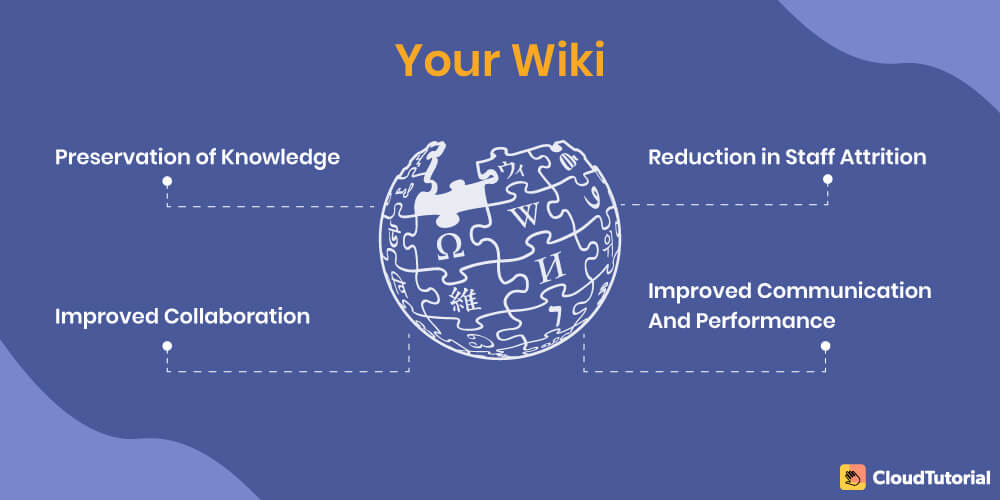Organizing and sharing files is a requirement for any company, whether big or small. Many businesses undergo losses each year owing to their lack of knowledge management. Corporate wiki is often measured as a solution to organize, share, and build the company’s knowledge internally.
Now, you might think an internal knowledge base is the same as an internal wiki or corporate wiki. But it is very different and you might want a contemporary knowledge base software instead of wiki software. Let’s understand the advantages of choosing a knowledge base over a wiki.
Table of Content
What is a Corporate Wiki?
A corporate wiki is the fundamental database of knowledge, where all of your team members can store, search, and create internal files and documents about projects, products, and processes they build.
You can contemplate it as your internal Wikipedia for your business. Here, there are no owners, restrictions, or integrated content producers. All you require is a web browser to glance through the internal wiki pages, read as well as edit the information. The quantity of users permitted to work together is potentially infinite.
Collaboration is the most significant feature in any corporate wiki software. Most of the wikis are developed with an open-source pattern and fabricated around knowledge collaboration and sharing.
How Companies are Using Corporate Wikis Internally?

A prominent corporate wiki helps to increase employee efficiency by supplying them with everything they require to do their tasks well. A company wiki can play a huge role in this plan. Here are a few great aspects stating how companies are using corporate wikis internally:
-
Preservation of Knowledge
Knowledge preservation is also the main differentiator for the companies that are keen to outperform their challengers. Each time if an employee leaves for any intention or goes on a break, an internal wiki makes sure that their knowledge does not leave the enterprise.
In this way, their knowledge is stored to train current as well as future hires. In a nutshell, it is beneficial for old, new, transitioning, and remote teams of employees.
-
Improved Collaboration
In a company, a corporate wiki escalates employee engagement in numerous ways. Most importantly, it is by forming your staff to collaborate and expand their ability to transfer and share knowledge. Such collaboration is vital for any team member who requires to share documents and information, which also needs to be updated constantly.
-
Reduction in Staff Attrition
A corporate wiki can aid in reducing staff attrition by refining access to the knowledge your company already possesses. These companies can leverage all the resources to yield a wide-ranging knowledge repository that cultivates organically.
As Benjamin Franklin, former president of the US, prudently says, “An investment in knowledge always pays the best interest.”
-
Improved Communication And Performance
Executives and managers employ corporate wikis to share customary operating processes, developers use it to collaborate on code, design teams use wikis to update brand style guides, and HR teams use it to share company policies and guidelines.
When every team shares their experiences and insights, creates and edits company information together, and assists everyone grows, it forms a culture of strong teamwork in the workplace. Thus, it allows your employees to work in a unified direction.
Build an advanced knowledge base for your customers and give them answers fast – real fast.
Take your app and help center to the next level with CloudTutorial.
Disadvantages of Corporate Wiki
While a corporate wiki can reassure collaboration between departments and team members, the platform has prominent trouble keeping up with alterations in our digital period. Let’s take a closer view of how its disadvantages influence the user experiences and why selecting it for constructing your knowledge bases can create your product less attractive.
-
Difficult To Edit The Content
In most of the cases, your teams will require to understand mark-up language rules, such as HTML to edit content within the wiki. This creates it challenging for the content to remain fresh and thus, ends up with nobody employing it at all.
Contemporary software for the knowledge base offers real-time editors – ‘What you see is what you get’ (WYSIWYG). This sanctions for superior user experience. Moreover, your non-technical members of the team would not be debarred from utilizing it.
-
Inadequate Search Function
Corporate wikis come with poor or no search capabilities. In the present world, where every person is utilizing search engines like Google and anticipates to search the information in a click, it can hamper your employees’ engagement with your organizational knowledge.
Consider your employees as the users of your knowledge. A reliable and fast search is crucial for your knowledge to be disbursed amongst them. An improved search will enhance customer support and improve detection while decreasing the time spent on retrieving the information. This is what you must look for in an internal knowledge sharing base.
-
Lack of Structure
Eventually, your company wiki turns out to be a dumping field for the content or information you do not understand what to do with. I am sure you all would have experienced this! Such huge unstructured information can be worse than none at all.
With this lack of structure, you are not saving resources or time with the wiki, instead, you are producing a knowledge cemetery. This significant element of responsibility can lead to a wide-ranging breakdown in the company’s productivity.
-
Inefficient Staff On-boarding
If you introduce your new employee to the pool of corporate Wikipedia, they will perhaps be astounded owing to its lack of structure. Such a wiki is beneficial for the exploration of content. But your employees will never have enough time to explore and search the content required. You will have to direct them to the right content quickly and if obligatory, confine the access to it.
-
Content Inconsistency
As everyone is permitted to edit your company wiki content, it leads to inconsistency in all your knowledge files. Also, you can end up with gaps and inaccuracy in your knowledge bases, as you have no alternate ways to regulate who can edit what content.
Nowadays, contemporary internal knowledge base software supplies more flexibility. Depending upon the control you require to implement over all the content being created and deposited, you can describe the roles for accessibility and writing.
For instance, the marketing squad might be able to ‘read-only’ the product content without altering it and the product squad can have an outline of the overall marketing strategy in return. Besides, with the ‘comments’ features rooted in tools, everyone can actively work together without leaving the content.
-
Less or No Analytics
A feedback loop plays a critical role in improving your knowledge management system and procedure. Corporate wikis supply minute or no analytics about how your team members consume the content.
For example, you would not be able to see who your top users are or examine the content gaps if any. All of these concerns would make it harder to develop and plan your content over the period, spot the content gap, and follow your employees’ engagement.
Corporate Wiki Vs Internal Knowledge Base
You may wonder that corporate wiki and internal knowledge base are a similar thing, as both of them supply a principal place for sharing and storing company information for the users to access. But if you go slightly deeper, there are certain subtle yet noteworthy dissimilarities.
The main difference between a corporate wiki and an internal knowledge base is that wikis are chiefly a collective tool, where everyone can assess and contribute to the information within it. This varies from a company knowledge base, which is observed exclusively as an abode for accessing and storing content, which would have been generated by devoted resources.
| Aspects | Corporate Wiki | Internal Knowledge Base |
|---|---|---|
| Editor |
|
|
| Analytical insights |
|
|
| Integration with workflows |
|
|
| Search functionality |
|
|
| Quality of content |
|
|
| Ability to state roles and permissions |
|
|
| Mark-up language |
|
|
Key Takeaway
Corporate wiki might seem like a noble idea to consolidate and augment collaboration around your organizational learning. But in reality, they lack flexibility, they rapidly become tough to administer and are usually a struggle to keep your team of employees involved with.
Selecting a modern and dedicated internal knowledge sharing base software will deliver your business the best of both the ecospheres by bringing ease of access, structure, and sharing and collaboration capabilities all available in one place.

Several companies facilitate knowledge base capabilities. Many of these come with leading products like CloudTutorial’s knowledge base, for example. Opting for such a distinctive internal knowledge base provides the best user experience and overall excellence.
Build an advanced knowledge base for your customers and give them answers fast – real fast.
Take your app and help center to the next level with CloudTutorial.
From corporate wiki vs internal knowledge base, we can examine that the former lets you add pages of text, and no audio or videos files, unless you spend in custom or additional functionality.
On the other hand, the latter allows you to publish manifold content, comprising images, slide decks, text, charts, and videos, and audio so that you can have the most precise information in an effective format.
Contact CloudTutorial to have a robust technique of internal knowledge sharing. This is the road to develop a strong groundwork for overall employee engagement. Moreover, it means that you must treat your employees like consumers by supplying them with the essential knowledge they need to do their jobs efficiently.
Try it out before you decide.
Create a test article NOW!
Using this tool, all you have to do is add your first test article and see how it looks. Now, you don’t have to sign-up or login into CloudTutorial software just to check how your first article appears.

